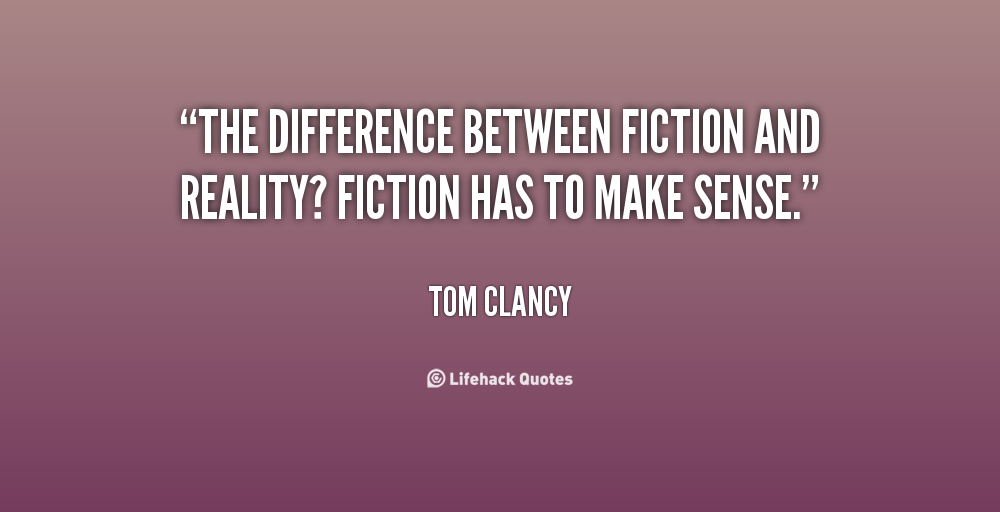Oh yeah. We're getting real profound today.
This is probably my all-time favorite writing quote, and this week I wanted to discuss how it applies to good vs evil.
Villains in fiction are often difficult characters to write. Why? Because we need them to have reasons for their evil deeds. We need to understand them, give them purpose. People often say you should think about your evil character as though he/she is the protagonist in their own story.
And yet…
Real evil often has no explanation. Some people in the real world are just bad. They do terrible things and we will never have any explanation. You don’t hear about their terrible childhood, or tragic event that set them on a path to darkness. There’s no hidden noble deed they’re secretly striving toward.
Fictional villains who are terrible for no reason get labelled as “unrealistic.” That’s a bad villain. Clearly the writer had no idea what they were doing. Yet when we watch the news, see something awful, and our kids ask “how could they do that?” what do we tell them? “Some people are just bad.” Or, “There are some bad people out there.”
But fiction has to make sense. We want to believe someone would only do a terrible thing if they had a real, concreate reason to.
I think that says a lot about who we are. The old philosophical question “are people inherently good or evil?” might have an answer in here. If evil is so difficult for writers to get right, what does that mean? Alright, maybe it’s not an answer, but people seem to want to believe others are inherently good. That’s kind of hopeful, isn’t it?
This also has negative consequences, though. If you so strongly believe everyone is good by nature, and then someone hurts another, you might blame the victim. You might think they had to have done something to provoke the attack, because you want the cruel actions to make sense. Also, you want to be able to protect yourself. You want to think that if you take all the necessary precautions, nothing bad will ever happen to you. After all, it’d be awfully scary if after doing everything right to protect yourself, you still got hurt.
But sadly, as we know, that happens. Because the real world doesn’t make sense like fiction. Because there is inexplicable evil out there. And even if there are reasons behind the cruel deeds, usually we won’t get to hear them. Sometimes, the real world owes us an explanation.
But overall, I think this is a hopeful thing. People want to believe others are good. For most of us, “evil” is a difficult concept to wrap our brains around. We have to strive to think of reasons for cruelty, give our villains tragic backstories, or even hidden noble quests that only appear wrong from the outside.
So, how do you think about evil in the real world? Do you think most people are good, evil, or something else? Happy pondering, and I'll see you Monday!
Villains in fiction are often difficult characters to write. Why? Because we need them to have reasons for their evil deeds. We need to understand them, give them purpose. People often say you should think about your evil character as though he/she is the protagonist in their own story.
And yet…
Real evil often has no explanation. Some people in the real world are just bad. They do terrible things and we will never have any explanation. You don’t hear about their terrible childhood, or tragic event that set them on a path to darkness. There’s no hidden noble deed they’re secretly striving toward.
Fictional villains who are terrible for no reason get labelled as “unrealistic.” That’s a bad villain. Clearly the writer had no idea what they were doing. Yet when we watch the news, see something awful, and our kids ask “how could they do that?” what do we tell them? “Some people are just bad.” Or, “There are some bad people out there.”
But fiction has to make sense. We want to believe someone would only do a terrible thing if they had a real, concreate reason to.
I think that says a lot about who we are. The old philosophical question “are people inherently good or evil?” might have an answer in here. If evil is so difficult for writers to get right, what does that mean? Alright, maybe it’s not an answer, but people seem to want to believe others are inherently good. That’s kind of hopeful, isn’t it?
This also has negative consequences, though. If you so strongly believe everyone is good by nature, and then someone hurts another, you might blame the victim. You might think they had to have done something to provoke the attack, because you want the cruel actions to make sense. Also, you want to be able to protect yourself. You want to think that if you take all the necessary precautions, nothing bad will ever happen to you. After all, it’d be awfully scary if after doing everything right to protect yourself, you still got hurt.
But sadly, as we know, that happens. Because the real world doesn’t make sense like fiction. Because there is inexplicable evil out there. And even if there are reasons behind the cruel deeds, usually we won’t get to hear them. Sometimes, the real world owes us an explanation.
But overall, I think this is a hopeful thing. People want to believe others are good. For most of us, “evil” is a difficult concept to wrap our brains around. We have to strive to think of reasons for cruelty, give our villains tragic backstories, or even hidden noble quests that only appear wrong from the outside.
So, how do you think about evil in the real world? Do you think most people are good, evil, or something else? Happy pondering, and I'll see you Monday!

 RSS Feed
RSS Feed
